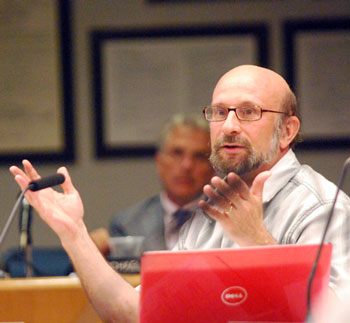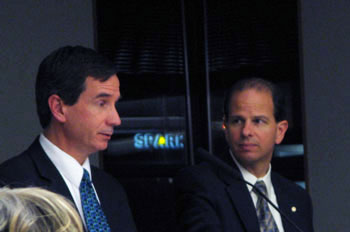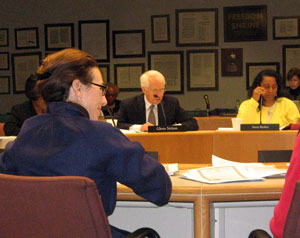State Health Care Law Prompts AATA Debate
Ann Arbor Transportation Authority board meeting (June 21, 2012): Deliberations by Ann Arbor Transportation Authority board members were uncharacteristically animated as they discussed how to comply with a state-imposed limit on the amount that public employers can contribute to their employee heath care costs. Ultimately the 4-2 vote was to act now, not later, to impose a cap of 80% on the amount that the AATA will contribute to its non-union employee health care costs.

AATA board member Roger Kerson argues against immediate action on Act 152, which limits the amount that public employers can contribute to employee health care. (Photos by the writer.)
That action meets the requirements of last year’s state Act 152, signed into law in September 2011, which limits employer contributions to a fixed dollar amount. But Act 152 also allows for the governing body of a public entity – in this case, the AATA board – to vote to cap the employer contribution at 80%, leaving 20% to be covered by employees. And that’s what the AATA board did at its June 21 meeting. Dissenting on the vote were Charles Griffith and Roger Kerson, who felt that the timing was perhaps too early – because the contract for AATA’s unionized workforce goes through the end of the year.
Based on the way that some other transit agencies in Michigan had handled their Act 152 compliance, Griffith and Kerson felt it might be possible to delay action for its non-union staff until AATA was required to act on its union workers’ health care costs. That approach is based on the idea that all employees participate in the same health care plan. However, the advice of the AATA’s own legal counsel was that Act 152 doesn’t explicitly provide for that uniform treatment of employees, just because they participate in the same health care plan.
Kerson urged that the board consider taking the AATA’s “windfall” from its compliance with the state law and reinvesting in non-health care compensation. Just because the state had given public entities a hammer, Kerson said, did not mean that they had to use it against their employees.
In other board action, the expenditure of funds for planning a north-south commuter rail project – from Howell to Ann Arbor, known as WALLY – was authorized. The money had previously been included in the AATA’s approved budget for fiscal year 2012, which ends Sept. 30, 2012. But the board had passed a resolution that requires explicit board approval before the money in the budget could be expended. AATA’s portion of the $230,000 in planning costs is $45,000, with the remainder contributed by a range of other public entities – the federal government, the city of Howell, the Ann Arbor Downtown Development Authority, and Washtenaw County.
Another planning effort that’s moving forward did not appear as a voting item on the agenda, but was included in CEO Michael Ford’s written report to the board: continued study of a possible Ann Arbor transit connector for a corridor running from US-23 and Plymouth southward along Plymouth to State Street and further south to I-94.
The AATA received a $1.2 million federal grant for an alternatives analysis phase of the study – which will result in a preferred choice of technology (e.g., bus rapid transit, light rail, etc.) and identification of stations and stops. That federal grant comes with the requirement of a $300,000 local match, which now appears to have been secured in the form of $60,000 from the city of Ann Arbor; $150,000 from the University of Michigan; and $90,000 from the AATA itself. A feasibility study for the connector has already been completed.
In other action, the board authorized the purchase of five new lift-equipped vehicles for its paratransit service. The five vehicles will replace existing vehicles that have reached the end of their useful life.
Another non-voting item on the meeting agenda, but one that was included in the CEO’s written report, was news of a collaboration between AATA and the Ann Arbor Public Schools. Starting this fall, the AATA will provide transportation for three existing school bus routes – one for each of Ann Arbor’s comprehensive high schools – by extending existing AATA routes. AAPS will pay AATA $0.50 for each student who boards, which will be counted with a pass that can be swiped through the fare box. [Full Story]






